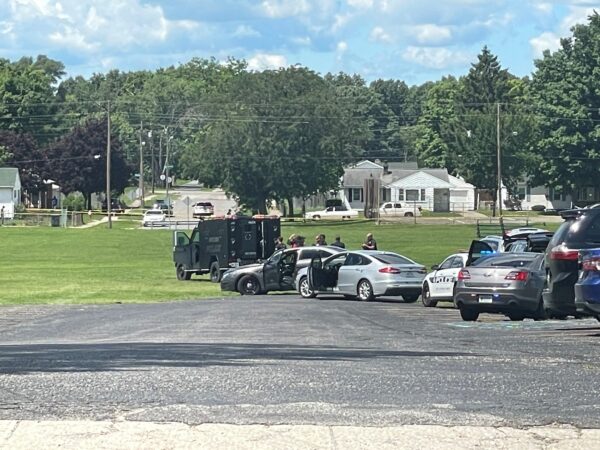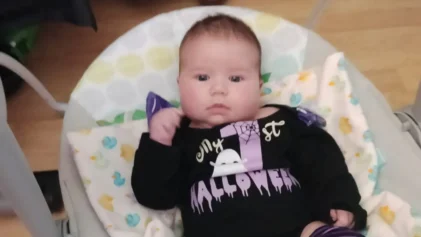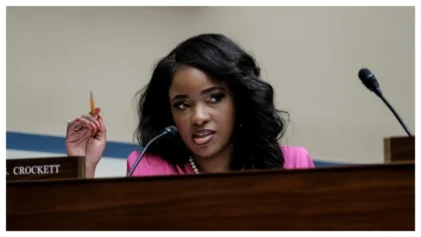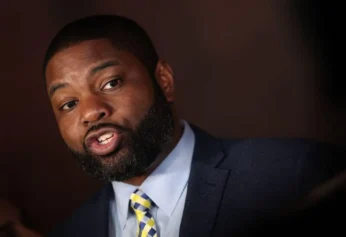Police officers in Indiana face backlash for fatally shooting a schizophrenic man after negotiating with him for 40 minutes.
According to reports, South Bend Police SWAT officers opened fire on Dante Kittrell while he was in an open field with a handgun threatening suicide on July 29. Police officials said they tried to negotiate with the 52-year-old for 40 minutes. Authorities said he raised the weapon in the direction of the armored SWAT truck, forcing officers to fire the fatal shots.

Community leaders and activists say police “executed” the man with a long history of mental health problems. The police union said de-escalation attempts were unsuccessful, so officers took the right measures to resolve the incident.
“It doesn’t matter how much de-escalating you try or how much policy you have,” said Josh Morgan, vice president of the South Bend Fraternal Order of Police. “His actions received the reaction that was given, the appropriate response, I believe.”
Facebook video footage of the incident shows a shirtless Kittrell pacing back and forth in the field next to the Coquillard Elementary School. The woman behind the cellphone camera says prayers for protection. The discussion between the man and police cannot be heard. The woman recording, Brianna Johnson, said she was not fully aware of what was happening but was told police were trying to calm a man who was “off his meds.”
Officers with guns drawn next to patrol cars surrounded the man. The video captured the scene from a distance and the shooting was not clear, but it happened when the truck pulled up on the field near the victim.
“I know he had some issues, but it has never been this bad,” said another woman off camera.
Kittrell reportedly suffered from schizophrenia. Henry Davis Jr., a city councilman, said he knew the man and he had been dealing with mental illness from a tender age. Davis, activists and faith leaders said a clinician-led crisis team should have been the first line of response to the incident.
Some witnesses said the officers did not let church leaders, the man’s mother, or a friend attempt to de-escalate the situation.
The Rev. J.B. Williams of Abundant Faith Family Ministries in South Bend reportedly witnessed the incident that he called a “military-style operation in response to a mental health crisis.” Williams said he was called to the scene by a congregation member, but he was told it was against police protocol to allow him to approach the man in crisis.
“I said, ‘But the protocol you are following is not applicable. Negotiators are negotiating for a person that’s normal. But this person was sick — you cannot negotiate with a person who is a schizophrenic,'” Williams told reporters. “I said, ‘You’re dealing with a whole different culture. You’re dealing with African-Americans. When mothers speak, Black boys listen, but they didn’t have the system designed for that.”
According to reports, Oaklawn Psychiatric Center in South Bend created a pilot team led by mental health professionals to help police respond to mental health-related calls. They started taking calls in spring, reports show. St. Joseph County leaders also allocated millions of dollars in December for mental health and homelessness.
The officer’s response is being reviewed by the St. Joseph County and Mishawaka Police Department.
“I know you’re here to shoot me. I know you’re here to take my life,” Kittrell told about 10 police officers who surrounded him, according to Williams.
South Bend Mayor James Mueller said the community should wait until the investigations are complete before responding to the incident. Community leaders have already made a list of demands for change, rallying at a vigil to condemn law enforcement’s actions.
“Our policy is that lethal force is a last resort,” Mueller told The Indiana Tribune, referring to the city’s police policy. “We need all the facts. We need the investigation to see exactly what happened and see if there’s anything we need to adjust.”
But Black leaders said the city has been slow in implementing change. Faith in Indiana and Black Lives Matter South Bend are demanding the public release of body-camera footage and 911 dispatch recordings related to the shooting. They also want an independent prosecutor to investigate the incident and want 10 percent of the city’s police budget to be used for the crisis team.
“They were available to respond to the incident on Friday,” Rebekah Go, a member of Faith in Indiana’s Jail Diversion Task Force, said. “Why they were not called, I do not [know]. They were the appropriate people to respond.”
The mayor acknowledged the need for more mental health assistance, especially among minority communities, and added, “we also need to find the will to prevent firearms from getting into the wrong hands.”
Mueller said it is uncommon to send a crisis response team separate from law enforcement when there is imminent danger, adding that it is already difficult to find officers to respond to situations that could end in death.
“I know there are a lot of calls for that, but in a volatile, potentially dangerous situation, I don’t know that those teams are the ones that would go in,” Mueller said.
Lynn Coleman, a police officer and resident, said the shooting was traumatic for Kittrell’s family but also for the officers involved.
“Those police officers didn’t come to work that day and say, ‘We’re going to kill someone,'” Coleman said after a candlelight vigil on Aug. 1, adding that every day he puts on the uniform, he is aware it could be his last. “They also have to deal with this. This is tragic for everyone.
The man’s mother, Marcia Kittrell, said she would need divine intervention to recover from her’s son death.
“They took him from me. They took him from me,” Marcia Kittrell screamed during the vigil. “I will see him again. They took him from me, but they can’t take him from me again.”


